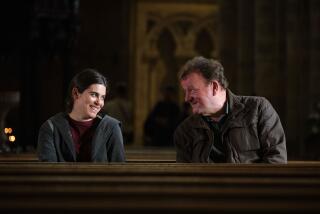‘Jimmy’s Hall’ won’t let Jimmy Gralton and his deportation be forgotten

Barry Ward and Simone Kirby, who star in “Jimmy’s Hall,” at the Four Seasons Beverly Hills.
Irishman Jimmy Gralton was deported without trial from his homeland in 1933. A self-avowed communist, he was deemed a subversive and a danger by the Catholic Church and the government.
But not that much is known about Gralton, who was all but a forgotten figure in his native country until the release a year ago of “Jimmy’s Hall,” Ken Loach’s film about the activist. The historical drama, which has received generally favorable reviews, opens in Los Angeles on Friday.
Loach, a veteran British director, has built a critical and sometimes a controversial reputation over the last five decades for his political and socially conscious films such as “My Name Is Joe” (1998) and the award-winning “The Wind That Shakes the Barley” (2006), set during the Irish War of Independence.
His frequent collaborator, screenwriter Paul Laverty, brought him Gralton’s story.
“It was extraordinary,” said Loach. “Extraordinary to be deported as an alien from your own country. Thechurch, the state and the landowners … they were just determined to get rid of him.”
And to get rid of any trace of what happened to Gralton.
“Not only was Jimmy kicked out of the country, but what they did was they tried to hide the paperwork,” noted Laverty. “Even today, any information about Jimmy’s deportation is no longer there. It’s interesting when injustice takes place how they try to wipe the record clear.”
“Jimmy’s Hall,” which stars Barry Ward as Gralton and Simone Kirby as his former girlfriend Oonagh, revolves around Gralton’s return to Ireland in 1932; he had been living in New York City during the previous decade. He hopes to live a quiet life with his mother tending to the family farm in County Leitrim.
But his friends and the young residents in the poor rural town want him to reopen the former club he had on his land. Not only was the club a place for people to discuss ideas but to learn, dance and listen to music. And the hall raised the ire of the Catholic Church and the government.
When Gralton decides to reopen the club, the authorities and the church act aggressively to close the hall and get rid of him.
“Although the subject matter of this is very Catholic, I think [the story] transcends it,” said Laverty. “It’s about a safe place where people can meet and think and talk. I think the notion of a safe place to challenge power is way beyond the confines of a 1930s’ hall and the Catholic Church and Ireland.”
When Gralton returned to Ireland, noted Loach, “it was not so long after the Russian Revolution. The Communist Party was more innocent then. People didn’t think of communism as part of Stalin and the gulags and all of that oppression. Many people saw the Communist Party as very progressive.”
“Jimmy’s Hall” was filmed on location in County Leitrim, which costar Ward found helpful. “You were surrounded by that beautiful landscape and the harshness of the land. So you got a sense of how tough it was to survive in such an environment.”
Kirby said the county remains rural. “There were miles and miles of land where they could film uninterrupted by telephone poles.”
Though Gralton’s house is standing, the club was burned down in 1932. A wooden sign in Leitrim states, “Site of the Pearse-Connolly Hall. In memory of Jimmy Gralton, Leitrim Socialist deported for his political beliefs in August, 13, 1933.”
“You can make out where the floor was,” said Ward. “Every year at the crossroads where the [Graltons’] house was, people gather to sing and dance.”
Because there was little known about Gralton, said Loach, “you have to fill in the gaps a little bit.”
“There was a real Jimmy Gralton, and we know certain public events to his life,” added Lavert. “I spoke to the family, and they told me stories that have been passed down through the generations. But there are some very private things between people you must just imagine.”
Such as the character of Oonagh, a fictional creation.
“Ken and Paul were talking to me and said a man in his prime who is really charismatic and is probably very well liked by his close-knit group, surely there was somebody he had his eye on,” said Kirby. “They asked his family if that was a possibility and they said yes.”
The film captures the joie de vivre of Gralton. “They wanted to show someone of a political bent who was charismatic and into joyous things like singing and dancing,” said Ward. “He was incredibly generous in spirit and a catalyst for good times.”
In May, Leitrim County authorities backed a motion by the political group Sinn Fein asking the Irish government to apologize for the deportation of Gralton.
“It’s quite interesting that even after all of these years people are still wrestling with the shadow of what happened to Jimmy,” said Laverty.
More to Read
Only good movies
Get the Indie Focus newsletter, Mark Olsen's weekly guide to the world of cinema.
You may occasionally receive promotional content from the Los Angeles Times.







